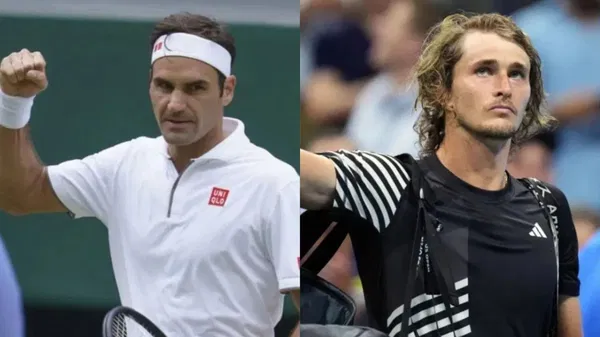
Just In:Roger Federer’s ‘Constructive Criticism’ Forces Alexander Zverev to Follow Post Match Ritual as ATP Legend Makes a Startling Claim……
Roger Federer, one of tennis’ most revered figures, is not just celebrated for his remarkable career, but also for his ability to mentor and influence the younger generation of players. His calm demeanor, unparalleled skills on the court, and a deep understanding of the game have earned him the admiration of peers and rising stars alike. Recently, Federer’s guidance was highlighted in an unexpected but enlightening way: his “constructive criticism” of Alexander Zverev, a rising star in men’s tennis, forced the German player to reevaluate his post-match rituals and approach to handling victories and defeats alike.
While criticism in professional sports is common, the source of it, especially when coming from someone like Federer, carries significant weight. In an interview following a particularly intense match, Zverev revealed how Federer’s feedback had impacted him, shedding light on a side of the Swiss legend that goes beyond his own successes. This revelation not only raised eyebrows among fans and experts but also underscored the importance of off-court mentorship in shaping the future of the sport.
The Importance of Post-Match Rituals in Tennis
Post-match rituals have long been a subject of discussion in sports psychology. The way athletes conduct themselves after a match—whether win or loss—can have a profound impact on their mental state, future performances, and overall career trajectory. For tennis players, the post-match routine is often as critical as preparation before the match itself. It’s a time for recovery, reflection, and most importantly, for managing the emotional highs and lows of the game.
Many top players like Novak Djokovic, Rafael Nadal, and Federer himself have highly regimented post-match routines, whether it’s their approach to media obligations, physical recovery techniques, or mental exercises. These rituals help players transition from the intense focus required during the match to the necessary recovery phase, ensuring they stay physically and mentally sharp for future matches.
However, not all players are able to adopt these rituals immediately. Young players, in particular, may struggle to manage their emotions after a tough loss or a tense victory, which can lead to burnout, frustration, or even poor performances in subsequent matches. Zverev, known for his fiery temperament and sometimes erratic emotional displays, has faced such challenges in the past.
Zverev’s Struggles with Post-Match Behavior
Alexander Zverev, at 27 years old, has long been seen as one of the most talented players on the ATP Tour. His powerful serve, aggressive baseline game, and athleticism have made him a fixture in the top ranks of men’s tennis. However, Zverev has also been known for his emotional volatility, which has sometimes been a point of contention for his coaches, fans, and fellow players.
While Zverev’s talent has never been in question, his post-match demeanor, particularly after losses, has often been scrutinized. At times, he has appeared visibly upset, leading to negative interactions with fans, officials, and media. On occasion, his frustration has spilled over into his interactions with the press, where he has been seen as dismissive or combative.
Zverev himself has acknowledged his struggles in managing his emotions after a match. Despite his high potential, his inconsistency—both in terms of performance and behavior—has been a subject of concern for those around him. As a result, the need for a structured post-match routine was becoming ever more apparent.
Roger Federer’s Constructive Criticism
In light of these challenges, Zverev received unexpected yet valuable guidance from Roger Federer. In a rare moment of candid insight, Federer shared his thoughts on Zverev’s post-match conduct, offering advice on how to handle the emotional rollercoaster of a professional tennis career. The Swiss legend emphasized the importance of a consistent post-match ritual that could help Zverev better navigate the mental and emotional strain of both wins and losses.
“I told him, ‘You need to be aware of how you come across after a match. People look up to you, and what you do in those moments can either help or hurt your reputation,'” Federer revealed in a recent interview. “It’s not just about the game, it’s about the way you carry yourself, especially in the aftermath. You can’t let the emotions control you entirely.”
Federer’s words were not intended to chastise Zverev but rather to offer “constructive criticism,” as the 20-time Grand Slam champion explained. Federer recognized Zverev’s immense potential but felt that a more disciplined and measured approach after matches could help him both mentally and professionally.
You may also like
Archives
Categories
- ABA
- Actor
- Actress
- Actress and singer
- Band
- Baseball
- Basketball
- Boxer
- Broadcasting corporation
- CCR
- cricketer
- Cyclists
- Dart
- Drummer
- Fictional character
- Football game
- Formula 1
- Golf
- Guitarist and songwriter
- Guitarists
- Gymnastics
- Hockey
- Ice hockey
- Marathon
- MLB
- Motocross
- MotoGP
- Musician
- Musician and drummer
- NFL
- NHL
- NRL
- Racer
- Red bull Racing
- Rider
- Rock band
- Rugby league
- Simone Biles
- Singer and songwriter
- Songwriter and musician
- Sport commentator
- Tennis
- Texas longhorns
- Track and field athlete
- Uncategorized
Leave a Reply